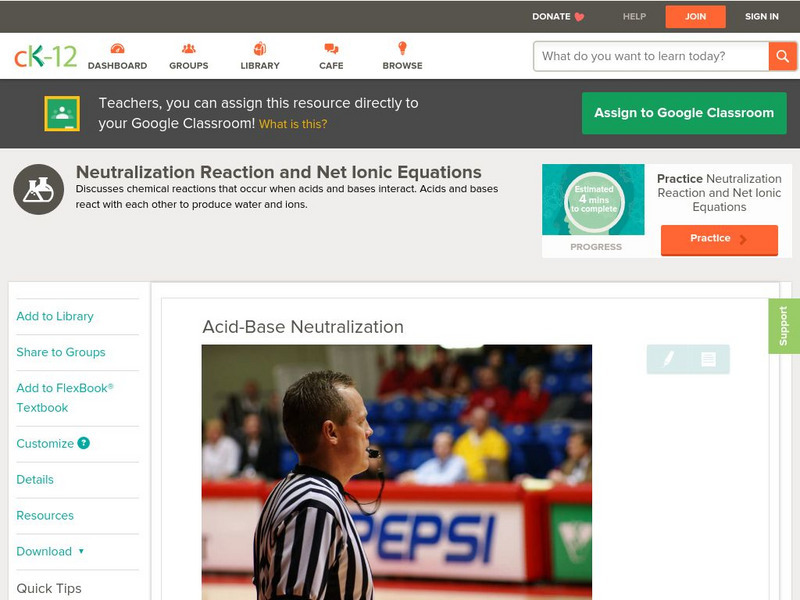CK-12 Foundation
Ck 12: Physical Science: Acid Base Neutralization
[Free Registration/Login may be required to access all resource tools.] The reaction of acids and bases and what ions are produced and the salts that form.
Khan Academy
Khan Academy: Double Replacement Reactions
Definition and examples of double replacement reactions. Predicting and balancing neutralization and precipitation reactions.
Open Curriculum
Open Curriculum: Introduction to Balancing Redox Reactions
The objective of this article is to introduce how to balance redox reaction chemical equations in neutral solution.
American Chemical Society
Inquiry in Action: Comparing the Amount of Acid in Different Solutions
Students will complete a procedure to find the solution that has the greatest amount of acid by comparing the amount of the acids in different solutions. This lab activity compares the amount of acid in differents solutions in a...
Sophia Learning
Sophia: Types of Reactions: Lesson 2
This lesson will give an overview of different types of chemical reactions.
Science Struck
Science Struck: Acid Base Reactions
Explains what acids and bases are and some of their properties, and gives examples of acid-base reactions.
Independence Hall Association
U.s. History: Reactions to a Troubled World
Read about the rising militarism and fascism in Europe and Asia as dictators expanded their territories. See how the United States reacted with its series of three neutrality acts.
Digital History
Digital History: Neutrality and the Lusitania [Pdf]
American neutrality in World War I was sorely tested with the attack and sinking of the passenger ship, Luisitania. Read information about the attack and find conflicting reactions by Franklin Roosevelt and William Jennings Bryan about...
Chem4kids
Chem4 Kids: Reactions: Names to Know
Acids and bases are scaled. These facts are good knowledge to have when classifying solutions as acidic, basic, or neutral.
Chiral Publishing
Chiral Publishing: An Introduction to Chemistry: Acid Base Reactions
See the changes that occur on a molecular level when acids and bases react. Colorful animations show how the particles interact with each other.
CK-12 Foundation
Ck 12: Salt Solutions
[Free Registration/Login may be required to access all resource tools.] Students begin by predicting whether a salt solution is acidic, basic, or neutral, and then practice writing balanced equations for hydrolysis reactions. They also...
Science Bob Pflugfelder
Science Bob: The Exploding Lunch Bag
This site contains a simple procedure for observing an acid-base neutralization reaction (baking soda and vinegar), in which the product, carbon dioxide, causes a zipped bag to explode.
PBS
Pbs Teachers: Soda Bottle Boat Experiment
Use the chemical reaction that occurs when mixing a base (baking soda) with an acid (vinegar) to turn a plastic soda bottle into a jet boat.
American Chemical Society
Middle School Chemistry: Chapter 6: Chemical Change
Twelve interactive chemistry lessons about chemical changes complete with handouts and animations.
Frostburg State University
Frostburg State University Chemistry Online: Polyatomic Ions
A good reference page for anyone studying polyatomic ions. Tables included on this page organize polyatomic ions by family and by charge. Information on naming compounds with polyatomic ions is also provided. There is a link to an online...
Science Education Resource Center at Carleton College
Serc: Magic Paper
This lesson serves as an introduction to neutralization reactions. Young scholars will observe that the goldenrod copy paper acts as an indicator changing colors and also that an acid can neutralize a base.
Chem Tutor
Chem Tutor: Chemistry: Titration and P H Math Problems
This is a titration and ph math problem exercise; the answers are also provided.
Simon Fraser University
Chem1 Virtual Textbook: Bases
Acting as an overview from the General Chemistry Virtual Textbook, this site explores bases and their related characteristics. Several formulas are also provided.
Chem Tutor
Chem Tutor: Titration
A concise tutorial that explains titrations and provides some practice problems with answers.
Frostburg State University
General Chemistry Online: Making Copper Sulfate
This page describes the way to produce anhydrous copper sulfate by a neutralization reaction. Also gives another way to make copper sulfate.
City University of New York
Brooklyn College: Bicarbonate Buffer
Explains the role of carbonic acid in the blood as part of a buffer system. Includes reactions.
PBS
Pbs Teachers: Scientific Breakthroughs in Germany: Curing the Storm in the Head
Explore medical breakthroughs in treating epilepsy. Discover how negative and positive particles behave in an electrically neutral environment, and perform an experiment to demonstrate how the human body can conduct electricity.
Frostburg State University
General Chemistry Online: Faq: Acids and Bases
Click the basic questions regarding acids, bases, and pH to view the answers. There are sections on basic concepts, buffer solutions, pH calculation, equilibrium constants, indicators, neutralization reactions, and titrations.
National High Magnetic Field Laboratory
Magnet Academy: Enrico Fermi
Enrico Fermi was a titan of twentieth-century physics. He outlined the statistical laws that govern the behavior of particles that abide by the Pauli exclusion principle and developed a theoretical model of the atom in his mid-twenties....


















